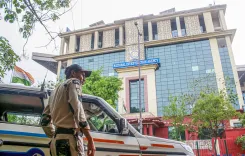What is the Impact of MP's 'Bhavantar Yojana' for Soybean Farmers?

Synopsis
Key Takeaways
- 'Bhavantar Yojana' aims to protect soybean farmers' interests.
- Direct compensation for price differences will be provided.
- Farmers can expect payments within 30 days of verification.
- The scheme could inject Rs 1,500 crore into the rural economy annually.
- Over 25 lakh small farmers are expected to benefit.
Bhopal, Sep 26 (NationPress) In an effort to protect the interests of farmers in the state, Madhya Pradesh's Chief Minister Mohan Yadav has introduced the 'Bhavantar Yojana' (price difference payment scheme) specifically designed for soybean growers.
This initiative, aimed at benefiting farmers, was revealed through a video announcement on X, emphasizing the state government's dedication to agricultural development, which remains a core focus in the region's progress.
CM Yadav, a strong proponent of rural upliftment, made the announcement on his official X account (@CMmadhyaMP), stating, "The state government prioritizes farmers' welfare above all. The 'Bhavantar Yojana' for soybeans is set to roll out in Madhya Pradesh. Should soybeans be sold below the MSP, our government will provide compensation for the losses incurred — whether caused by excessive rainfall, yellow mosaic virus, or other reasons. Farmers will receive compensation if they experience a loss in the fair average quality price and minimum support price."
As part of the Bhavantar Yojana, which draws inspiration from similar programs in neighboring regions, farmers will be eligible for direct compensation covering the gap between the Minimum Support Price (MSP) — currently set at Rs 5,328 per quintal for soybeans by the central government — and the actual market price at mandis. This initiative aims to protect producers from market volatility, ensuring they receive fair returns without being reliant on mandatory procurement.
Farmers enrolled in the scheme can anticipate compensation payments within 30 days following sale verification, which will be deposited directly into their bank accounts through DBT (Direct Benefit Transfer). Madhya Pradesh, often referred to as the 'Soybean Bowl of India', accounts for nearly 60 percent of the country's soybean yield, with over 50 lakh hectares cultivated across districts such as Indore, Ujjain, and Dewas.
However, fluctuating global prices, intensified by trade disputes and unpredictable monsoons, have often placed farmers in a difficult position, with many selling at prices 20-30 percent lower than the MSP.
During the last kharif season, it was estimated that farmers lost Rs 2,000 crore in unrealized income due to these downturns. The Yojana is expected to inject up to Rs 1,500 crore annually into the rural economy, aiding over 25 lakh small and marginal farmers.









